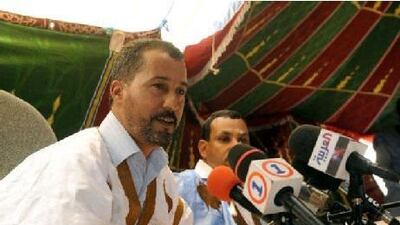RABAT // The guns fell silent 19 years ago in the disputed territory of Western Sahara, yet war of a kind still rages there.
As UN-led talks to decide Western Sahara's future stagnate, the rivals Morocco and the Polisario Front, a native Saharawi independence movement that is backed by Algeria, are opting increasingly for headline-grabbing shows of force in the battle for public opinion, analysts say.
Last month, the Polisario arrested one of its police officials, Mustapha Selma Ould Sidi Mouloud, who publicly backed a Moroccan autonomy proposal for Western Sahara, accusing him of espionage. Morocco denies that claim and demands his release. The arrest triggered the latest in a spate of diplomatic shoving matches that analysts say could undermine the United Nations' efforts to settle the conflict.
"The Security Council is thinking about a solution," said Jacob Mundy, a co-author of a new book about the conflict and a PhD candidate at the University of Exeter in England. "The parties have never really left the battlefield."
At stake is a former Spanish colony roughly the size of Great Britain that was largely annexed by Morocco in 1975. For centuries, it has been home to the Saharawis, historically nomads of Yemeni origin. After Morocco invaded Western Sahara, half of them fled to Polisario-run refugee camps in the Algerian desert. About 100,000 Saharawis still live in the territory, outnumbered more then 2-to-1 by Moroccans.
A 16-year war ended in 1991 with a UN-brokered ceasefire to allow an independence referendum, which foundered on disagreements over who should vote. The stalemate has stranded more than 100,000 Saharawi refugees in camps in the desert. The Polisario still wants a referendum with independence as an option. Morocco rules that out and proposes a measure of autonomy instead. A series of UN-led talks begun in 2007 have so far failed to break the impasse.
"The Moroccans aren't budging and neither are the Polisario," said Yahia Zoubir, an expert on Western Sahara. "The issue of human rights is the new battlefield." Enter Mr Ould Sidi Mouloud, a Polisario police official in the refugee camps who burst into headlines by publicly defending Morocco's autonomy plan for Western Sahara while visiting Moroccan-held territory in August. Vowing to promote the plan to fellow refugees, Mr Ould Sidi Mouloud set out for the refugee camps via neighbouring Mauritania, his progress followed closely by the Moroccan media.
Last month he was arrested at Mehrez, a settlement in a Polisario-controlled corner of Western Sahara, and remains detained there after being accused of espionage, said Ahmed Boukhari, the Polisario's UN representative. But Moroccan authorities describe Mr Ould Sidi Mouloud as nothing more than an honest dissenter. "This was an expression of a political opinion, not espionage," said Khalid Naciri, Morocco's communication minister. "Nothing justifies the treatment to which he's been subjected."
The Polisario rejects those claims, emphasising Mr Ould Sidi Mouloud's background in its security services. "Let there be no confusion: this is a question of a military man under legal investigation," Mr Boukhari said. "This issue was fabricated by Morocco to distract from its own policies in occupied Western Sahara." The Polisario demands Morocco release Ali Salem Tamek, Brahim Dahane and Ahmed Naciri, Saharawi activists arrested last year on treason charges after visiting the Polisario-run camps.
The men deny those accusations, as well as reports that they met Polisario and Algerian military officials, said Mohamed Lehbib Rguibi, one of their lawyers. Their trial opens this month. Moroccan authorities have released four other activists arrested with the three men who are still being held, but have not dropped the treason charges against them. Meanwhile, attempts to restart a stalled UN family-visits programme failed last month when Polisario officials barred passengers from Western Sahara from getting off their aeroplane near the camps.
Mr Boukhari called the move a protest against Morocco's monopolising of the selection of the participants of the visits progamme. Mr Naciri, the Moroccan communication minister, accused the Polisario of trying to spoil the peace talks, last held in February. It is unclear when talks might resume. Both parties say they are committed to negotiations but analysts said the climate remains hostile. "Normally parties enter into a peace process because their attitudes have fundamentally changed," Mr Mundy said. "That wasn't the case in Western Sahara."
In July, King Mohamed VI pledged in a speech that Morocco would not give up "a single inch" of Western Sahara. A letter written by Christopher Ross, the UN secretary general's personal envoy to Western Sahara, and leaked to media in August, said Moroccan diplomats have insisted so far that talks focus solely on Morocco's autonomy proposal. Mr Boukhari said the Polisario demanded that any proposal for Western Sahara's future be put to a referendum that includes independence as an option.
Analysts say neither party is likely to stray from its position without a nudge from outside. "The Security Council needs to take control of the peace process by imposing deadlines on the parties and telling them things they don't want to hear," Mr Mundy said. Mr Zoubir said Western Sahara's obscurity makes it a low priority for world powers. "I don't see the talks leading anywhere except to signal that the issue isn't simply dead."

